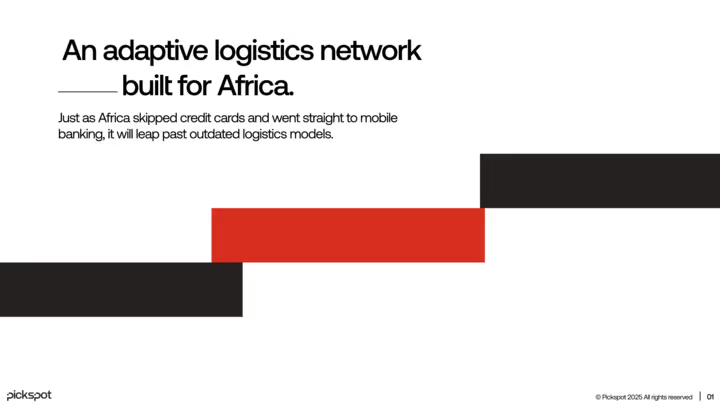
The entire logistics industry has been optimizing the wrong variable. Every company obsesses over speed and cost. They build algorithms to predict traffic patterns. They map optimal routes.
The entire logistics industry has been optimizing the wrong variable.
Every company obsesses over speed and cost. They build algorithms to predict traffic patterns. They map optimal routes. They track packages in real-time.
But they're all trying to perfect the chase instead of creating something worth finding.
The fundamental problem isn't efficiency. It's that human beings are not stationary.
We've watched digital payments evolve rapidly while physical delivery remains stuck in the past. The disparity is staggering.
You can send money instantly to someone's digital wallet anywhere in the world. But delivering a physical package to that same person? You're back to hunting humans.
In emerging markets, this becomes absurd. Riders spend their days calling customers, asking for landmarks, trying to coordinate meetups. "I'm by the blue house near the church." "My cousin is home, deliver to him instead."
The African last mile delivery market is projected to reach $2.35 billion by 2030. But without fixed delivery points, every transaction becomes a coordination nightmare.
We realized something fundamental: without a fixed point for delivery, everything crashes. You can optimize for speed and cost however much you want. But if your target is moving, optimization can only get so good.
Companies have tried solving this with better location services. What3Words gives every location a three-word address. GPS coordinates pinpoint exact spots.
These solutions half work at best.
They're still just giving you coordinates in a different way to a location. They don't solve the fundamental problem of having to look for the person.
The missing piece isn't better coordinates. It's infrastructure.
You need places where people can actually receive something. Physical infrastructure that doesn't move.
We borrowed principles from zero-knowledge cryptography and applied them to physical logistics.
The World Economic Forum identified zero-knowledge proofs as one of five key privacy-enhancing technologies. We saw how this could transform physical delivery.
Here's how it works: You get a digital handle like zuri@pickspot.world. It functions like a public key for delivery while preserving your location privacy.
The handle points to a smart locker. Multiple handles, thousands even, can point to the same locker. It's shared infrastructure.
Riders find the locker easily. They don't hunt humans anymore. They deliver to fixed points.
You only get access to the locker when you have something inside it. Thousands of people can use the same physical location without compromising anyone's privacy.
The reason this succeeds where other solutions fail comes down to simplicity.
We're not trying to make coordinates more precise. We're not trying to track people better. We're creating infrastructure that works regardless of whether people move.
The handle resolves to a locker. The locker is simultaneously public and private. Public enough for riders to find. Private enough to protect individual deliveries.
This transforms addresses from static, public information into dynamic, privacy-preserving endpoints.
Traditional addressing systems assume everyone has a permanent, findable location. In regions with 80% infrastructure project failure rates, this assumption breaks down completely.
The privacy implications extend far beyond convenience.
Current delivery systems require exposing your exact location to complete strangers. Senders know where you live. Delivery companies track your movements. The entire supply chain has visibility into your personal geography.
Our system proves delivery completion without exposing recipient locations or movements. Zero-knowledge principles applied to physical space.
You can receive packages without revealing where you actually live or work. The sender knows the package was delivered. The rider knows where to take it. But your private location stays private.
This creates what we call programmable geography without the surveillance state.
The economic implications are massive.
E-commerce growth in Africa has been constrained by delivery infrastructure. People want to buy online but can't reliably receive packages.
Fixed delivery points change this equation completely. Suddenly, anyone can have a reliable delivery address without needing formal housing or traditional addressing systems.
Street vendors can receive inventory. Remote workers can get equipment. Families can access goods regardless of their housing situation.
We're not just building delivery infrastructure. We're building economic infrastructure that enables commerce for people who were previously excluded.
We're not a courier company. We're the rails.
We don't deliver packages. We enable delivery by creating the infrastructure layer that makes reliable delivery possible.
Every logistics company can use our network. Every individual can get a digital handle. Every rider can find fixed delivery points instead of hunting humans.
The technology scales through cryptographic trust rather than centralized control. The more people use it, the more valuable the network becomes for everyone.
This represents a fundamental shift in how we think about physical space and digital identity. Your delivery address becomes programmable, private, and portable.
Physical addresses have always been static and public. If you know someone's address, you know where they live.
We're making addresses dynamic and private. Your delivery endpoint can change without breaking the system. Your packages reach you without exposing your location.
This creates new possibilities for how people interact with physical space. You can maintain privacy while participating in commerce. You can receive deliveries without revealing personal information.
The implications extend beyond packages. This infrastructure could support any physical interaction that currently requires location exposure.
We're building the foundation for a more private, more accessible physical economy. One where your participation doesn't require surrendering your privacy or having a permanent address.
The future of delivery isn't about chasing people faster. It's about creating infrastructure that works for everyone, regardless of where they are or how they live.